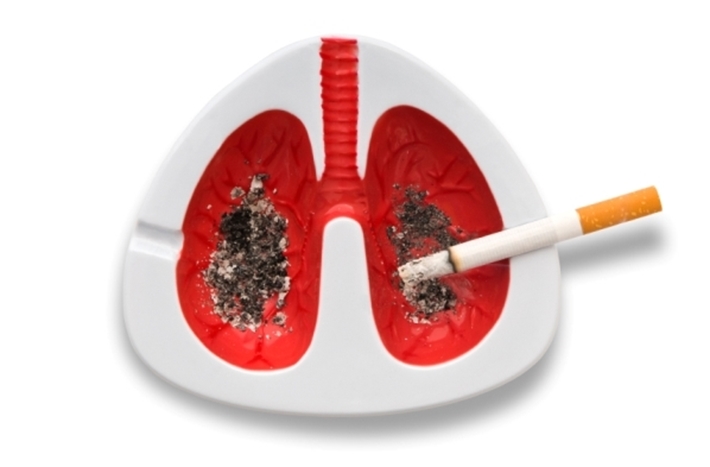Lung cancer - symptoms and prevention

1/16/2018 2:53:54 PM
Lung cancer may not produce any noticeable symptoms in the early stages. In approximately 40% of people diagnosed with lung cancer, the diagnosis is made after the disease has advanced. In one-third of those diagnosed, the cancer has reached stage 3.
Read on to learn more about lung cancer symptoms, what to watch out and listen for, and how early screening may help people at high risk for the disease.
1. The symptoms of lung cancer
Cough that won’t quit
Be on alert for a new cough that lingers. A cough associated with a cold or respiratory infection will go away in a week or two, but a persistent cough that lingers can be a symptom of lung cancer. Don’t be tempted to dismiss a stubborn cough, whether it is dry or produces mucus. See your doctor right away. They will listen to your lungs and may order an X-ray or other tests.
Change in a cough
Pay attention to any changes in a chronic cough, particularly if you are a smoker. If you are coughing more often, your cough is deeper or has hoarse sound, or you are coughing up blood or more mucus than usual, it’s time to make a doctor’s appointment. If a family member or friend experiences these changes, suggest that they visit their doctor.
Breathing changes
Shortness of breath or becoming easily winded can also be possible symptoms of lung cancer. Changes in breathing can occur if lung cancer blocks or narrows an airway, or if fluid from a lung tumor builds up in the chest.
Make a point of noticing when you feel winded or short of breath. If you find it’s difficult to breath after climbing stairs or performing tasks you could do before without having a hard time breathing, don’t ignore it.
Pain in the chest area
Lung cancer may produce pain in the chest, shoulders, or back. An aching feeling may not be associated with coughing. Tell your doctor if you notice any type of chest pain, whether it is sharp, dull, constant, or comes and goes. You should also note whether it is confined to a specific area or is occurring throughout your chest. When lung cancer causes chest pain, the discomfort may result from enlarged lymph nodes or metastasis to the chest wall, the lining around the lungs called pleura, or the ribs.
Wheezing
When airways become constricted, blocked, or inflamed, the lungs produce a wheezing or whistling sound when you breathe. Wheezing can be associated with multiple causes, some of which are benign and easily treatable.
However, wheezing is also a symptom of lung cancer, which is why it merits your doctor’s attention. Don’t assume that wheezing is caused by asthma or allergies. Have your doctor confirm the cause.
Raspy, hoarse voice
If you hear a significant change in your voice, or if someone else points out that your voice sounds deeper, hoarse, or raspier, get checked out by your doctor. Hoarseness can be caused by a simple cold, but this symptom may point to something more serious when it persists for more than two weeks. Hoarseness related to lung cancer can occur when the tumor affects the nerve that controls the larynx, or voice box.
Drop in weight
An unexplained weight loss of 10 pounds or more may be associated with lung cancer or another type of cancer. When cancer is present, this drop in weight may result from cancer cells using energy. It could also result from shifts in the way the body uses energy from food.
Don’t write off a change in your weight if you haven’t been trying to shed pounds. It may be a clue to a change in your health.
Bone pain
Lung cancer that has spread to the bones may produce pain in the back or in other areas of the body. This pain may worsen at night while resting on the back. It may be difficult to differentiate between bone and muscle pain. Bone pain is often worse at night and increases with movement.
Additionally, lung cancer is sometimes associated with shoulder, arm, or neck pain, although this is less common. Be attentive to your aches and pains, and discuss them with your doctor.
Headache
Headaches may be a sign that lung cancer has spread to the brain. However, not all headaches are associated with brain metastases. Sometimes, a lung tumor may create pressure on the superior vena cava. This is the large vein that moves blood from the upper body to the heart. The pressure can also trigger headaches.
2. How to prevention lung cancer?
Avoiding risk factors and increasing protective factors may help prevent lung cancer.
- The following are risk factors for lung cancer:
- Cigarette, cigar, and pipe smoking
- Secondhand smoke
- Family history
- HIV infection
- Environmental risk factors
- Beta carotene supplements in heavy smokers
- The following are protective factors for lung cancer:
- Not smoking
- Quitting smoking
- Lower exposure to workplace risk factors
- It is not clear if the following decrease the risk of lung cancer:
- Diet
- Physical activity
- The following do not decrease the risk of lung cancer:
- Beta carotene supplements in nonsmokers
- Vitamin E supplements